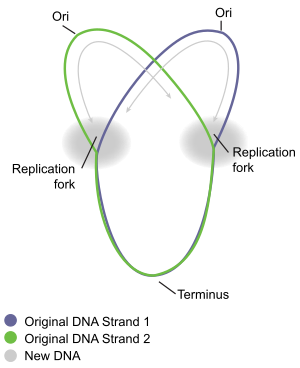
A circular chromosome is a chromosome in bacteria, archaea, mitochondria, and chloroplasts, in the form of a molecule of circular DNA, unlike the linear chromosome of most eukaryotes.
Most prokaryote chromosomes contain a circular DNA molecule. This has the major advantage of having no free ends (telomeres) to the DNA. By contrast, most eukaryotes have linear DNA requiring elaborate mechanisms to maintain the stability of the telomeres and replicate the DNA. However, a circular chromosome has the disadvantage that after replication, the two progeny circular chromosomes can remain interlinked or tangled, and they must be extricated so that each cell inherits one complete copy of the chromosome during cell division.